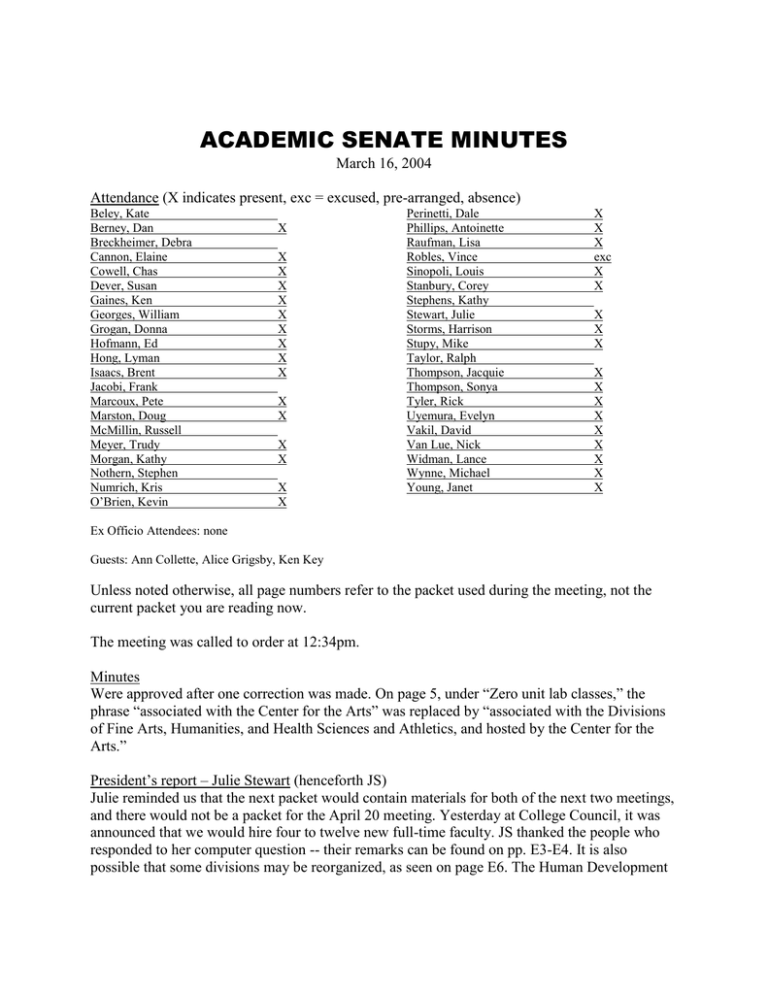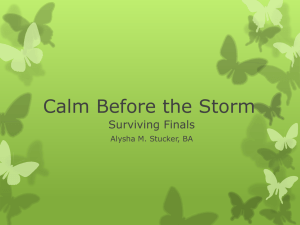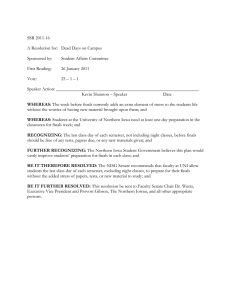March 16, 2004
advertisement

ACADEMIC SENATE MINUTES March 16, 2004 Attendance (X indicates present, exc = excused, pre-arranged, absence) Beley, Kate Berney, Dan Breckheimer, Debra Cannon, Elaine Cowell, Chas Dever, Susan Gaines, Ken Georges, William Grogan, Donna Hofmann, Ed Hong, Lyman Isaacs, Brent Jacobi, Frank Marcoux, Pete Marston, Doug McMillin, Russell Meyer, Trudy Morgan, Kathy Nothern, Stephen Numrich, Kris O’Brien, Kevin X X X X X X X X X X X X X X X X Perinetti, Dale Phillips, Antoinette Raufman, Lisa Robles, Vince Sinopoli, Louis Stanbury, Corey Stephens, Kathy Stewart, Julie Storms, Harrison Stupy, Mike Taylor, Ralph Thompson, Jacquie Thompson, Sonya Tyler, Rick Uyemura, Evelyn Vakil, David Van Lue, Nick Widman, Lance Wynne, Michael Young, Janet X X X exc X X X X X X X X X X X X X X Ex Officio Attendees: none Guests: Ann Collette, Alice Grigsby, Ken Key Unless noted otherwise, all page numbers refer to the packet used during the meeting, not the current packet you are reading now. The meeting was called to order at 12:34pm. Minutes Were approved after one correction was made. On page 5, under “Zero unit lab classes,” the phrase “associated with the Center for the Arts” was replaced by “associated with the Divisions of Fine Arts, Humanities, and Health Sciences and Athletics, and hosted by the Center for the Arts.” President’s report – Julie Stewart (henceforth JS) Julie reminded us that the next packet would contain materials for both of the next two meetings, and there would not be a packet for the April 20 meeting. Yesterday at College Council, it was announced that we would hire four to twelve new full-time faculty. JS thanked the people who responded to her computer question -- their remarks can be found on pp. E3-E4. It is also possible that some divisions may be reorganized, as seen on page E6. The Human Development courses may be moved from Humanities to Behavioral and Social Science. If you have any questions or comments, please let JS know. Educational Policies Report – Chas Cowell New members have joined the committee. The committee will be dealing with policies about academic standards, academic probation, course repetition, auditing a class, and academic renewal. Academic renewal was described as a means for students who have struggled in the past but succeeded recently to remove past grades from their GPA. Currently, students can only use grades from ECC in our GPA calculation. One question facing the committee is whether or not to allow grades from other schools to count as recent success. JS noted that the Ed Policies committee will take the lead on any proposed changes to Math and English (e.g. AA/AS degree requirements getting discussed at the state level). Faculty Development – Lisa Raufman There have been no meetings yet, but there is an annual technology conference in Ontario, California March 22-24 – see the faculty listserv for more details. Susan Dever added that Howard Story has a few free passes for the displays in the exhibit hall. Finance and Special Projects – Lance Widman Before Lance gave his report, JS praised him for his input about the unlawful discrimination policy. On pages A9-A11 are minutes from recent PBC meetings. Upcoming events include a revise to the governor’s budget, due out in April. (May was usually when this came out.) We can also expect 3-5 ballot initiatives in November’s election. Where we stand with the 75/25 obligation is unclear at the moment. Currently, we have about a 9% reserve, although there are trends we need to address. David Vakil added that if the budget stays as is and no changes are made, our currently large reserve will be gone in 2 years, so something will have to change. Susan Dever added that there are departments on campus that are severely understaffed, nearly to the point of reaching crisis situations. This understaffing is causing a backlog of work and is even beginning to affect jobs at higher levels. JS added that, as seen on page A8, we have lost 290 FTES from our base enrollment due to the concurrent enrollment issue. This reduces our cap allowance and our state apportionment (i.e. the funding) and could effect salary as well. A VP at Glendale Community College notes that Glendale is barely on a state-watch list, and wears this as a badge of honor, as they are serving students to the max. While we are clearly fiscally sound now, it is less clear about our student services. Chas Cowell asked if people have talked about the UC/CSU enrollment decreases and how those students that will be coming to the community college system will affect us. Lance replied that there aren’t that many UC/CSU students compared to the overall community college system, so it won’t be a large effect. David Vakil added that we are already several percent over-enrolled, and aren’t getting paid for many students currently in attendance here. Legislative Action – Donna Grogan Constitution changes proposed at today’s meeting appear on pages B1-B2. Curriculum Committee – Janet Young As discussed at the last Senate meeting, the zero unit L-classes have been inactivated. This will be sent to the Board of Trustees on April 19. The Curriculum Committee approved 17 courses for title V updates. Lisa Raufman asked about the summer course schedule listings of the Lcourses and how students would know not to enroll in these. Ann Collette replied that students can’t enroll in these classes, even when they were offered. Students would get automatically enrolled in an L-class when they enrolled in the parent class. Lisa then asked how students would be made aware of this. The question should be directed to Bill Mulrooney. Calendar Committee – Debra Breckheimer & Kris Numrich The proposal listed on page C19 about having a potential Fall Break won’t be voted on today. Before discussion about this began, Ann Collette pointed out that there will be a March 26 meeting of the Calendar Committee, and that option 2 on page C19 wasn’t allowed. Dawn Guzman asked how someone could voice concern about issues related to the calendar committee, such as the winter session, if she can’t attend the meetings. Suggestions including emailing Julie Stewart, the committee members, or the head of the committee, VP Pat Caldwell. Questions/comments about the proposed Fall Break included: Corey Stanbury noting that if we shifted classes so they overlapped Christmas, we would probably lose students. Lance Widman pointing out that if we started a week earlier, there would be little time for teachers who teach an 8-week summer class to recover before the Fall term started. Chas Cowell pointing out that consolidating fall holidays would make this more attractive, particularly for Monday classes which lose out right now. Evelyn Uyemura suggesting that if the intent was to make Spring and Fall more alike, that we should consider dropping Spring Break instead of adding a Fall Break. Rick Tyler pointing out that individual holidays are less intrusive on education than a full week-long break is. It is much easier to keep students in school mode with shorter interruptions. Doug Marston adding that starting Fall term a week early might cost us some students, especially in programs that already start early. Dan Berney asked if this is something or schools do, or are we the only people looking at it. Kris replied the issue came up in a discussion on the faculty listserv, so she brought it here. Trudy Meyer noted that weakest students in an 8-week class are less likely to enroll after a weeklong break. David Vakil asked how many holidays are in Fall compared to Spring? He didn’t feel informed about repercussions of a weeklong break. Lisa Raufman added that having a current calendar in front of us would help with this discussion. At this point, Kevin O’Brien and Susan Dever moved/seconded that the motion to recommend to the Calendar Committee that they consider investigating a Fall Break be treated as an emergency motion. This motion was approved. Then this emergency motion was called for a vote and the motion, moved/seconded by Numrich/Marcoux failed: 4 in favor, many more opposed. Academic Technology Committee – Pete Marcoux Pete Marcoux noted that he misspoke at the last meeting. Currently ITS’s spam blocker does scan the body of email messages when trying to filter out spam. The ATC has requested that the body NOT be scanned for spam content. If you are not receiving emails you expect or if you are getting spam, send a message (including the spam) to spammanager@elcamino.edu . The committee is currently investigating software needs – contact your representative if you have concerns. There will also be a faculty survey taken on web course management systems. The Distance Education Advisory Committee already voted roughly 2:1 in favor of the Blackboard system. On March 25, from 12:30-2:30 in the Alondra room, a representative from WebCT will be present, and the next day a rep from Blackboard will be in Library 202 from 13pm to address concerns and answer questions. The ATC is also beginning to address issues of “smart classrooms” in light of the many and varied new construction projects starting soon. Contact Howard Story for more information. Faculty laptops will not be funded from the bond money. Funds for this will have to come from the school’s General Fund. A prioritizing committee will be formed for distribution. It is clear that some faculty need upgrades/repairs more desperately than others, and this committee will take care of issues like that. Susan Dever added that money for both hardware and software will be necessary. Pete asked how soon money could be awarded. Lance Widman and David Vakil said it should be brought to PBC very soon if for Fall 2004. Unfinished Business The Constitution updates proposed on pages B1-B2 were called to a vote by nature of coming from a standing committee. There was no discussion and the changes passed unanimously. Similarly, the revised Independent Study policy on Page B4 was called to a vote and passed unanimously with no discussion. New Business Unlawful Discrimination Policy (Priority Registration) The Procedure regarding unlawful discrimination on pages C1-C18 was discussed. Lance had several suggestions which didn’t make it into the packet, and Leo Middleton will make some changes. Evelyn Uyemura noted that the first paragraph on page C2, which is repeated in the 2nd paragraph on page C3 is not clearly written and hard to understand. JS noted that the language might be mandated by the state. Chas Cowell asked how “full and equal access” affects priority admission and registration. Having priority might be contradictory to “full and equal access.” Trudy Meyer noted that winter classes were mostly closed before open enrollment began, so the classes filled up during these early enrollment periods, open to international, EOPS, and athlete students. Donna mentioned that this kind of thing could be detrimental to some programs. Ken Key asked if, by changing this policy, we would be opening a door for “non-native students.” Lisa Raufman asked what the deadline was for getting access – when is getting access “too late” to be counted? Brent Isaacs said that if new students do get eventual prioritization, they will have access. Final exam week At the last meeting, we discussed the implementation of a finals’ week, but this was premature as the decision to have one is not a done deal. It is probably too late to have one in Fall 04, as the Senate hasn’t voted on a range of options. Kris Numrich noted that a proposed example will be discussed at the next calendar committee, but JS said that VP Caldwell told her (JS) that it was too late to implement. Ann Collette said that the printer gets the fall schedule soon, and we would miss our printing deadline if we waited to print a finals’ week schedule. Kris said that the current schedule, sent to the printer, was put together without a finals week. David Vakil said that fundamentally academic issues, such as the inclusion of a finals’ week, should not be dictated by a printer’s schedule, particularly when we give them a schedule months in advance. Less notice should be sufficient. Evelyn Uyemura added that many changes are made to the schedule after it is printed, including room, staff, and course-time changes. Students are made aware of changes after they have been printed. Trudy Meyer added that even if we don’t print this in the Fall schedule (or even have it in the Fall), the issue should still be discussed. Bill Georges asked how 8-week classes would be affected by a finals’ week. JS replied that we have been asked to consider different options. We were also asked about having a winter session, having 16 weeks of instruction followed by a finals’ week (16+1), and having 15 weeks of instruction followed by a finals’ week (15+1). Susan Dever noted that tweaking the schedule does play havoc with support staff, such as the tutors, counselors, library, etc. She asked that we stick to the current format. Donna Grogan said that several courses don’t have a final exam in their course outline, so teachers do other things during finals’ week. Rick Tyler asked if having a finals’ week requires giving a final – no, it does it. Trudy Meyer noted that during the 18-week semester, finals’ week was sticky for the short-term classes (e.g. 9-week classes), but they made it work. Kris Numrich said that the number of minutes in the first 15 weeks of the example finals’ week semester is the same as what we had in the 18-week semester. [Editor’s note: our current calendar has more class minutes than the 18-week semester.] Kevin O’Brien asked if 15 weeks now is equivalent to 17 weeks during the 18-week semester, and Kris replied it was. She added that compared to another school, we have 1 week more of class time. Mike Stupy then asked why don’t we consider the 16+1 option. Pete Marcoux noted that he was told by Tom Lew that some of the weird scheduling issues in the current schedule are dictated by our needs to have breaks in the classes and the schedule. JS concluded the discussion by asking for people with a preference to get a written motion to her, for inclusion in the next packet. Announcements None. Meeting was adjourned at 2pm.

